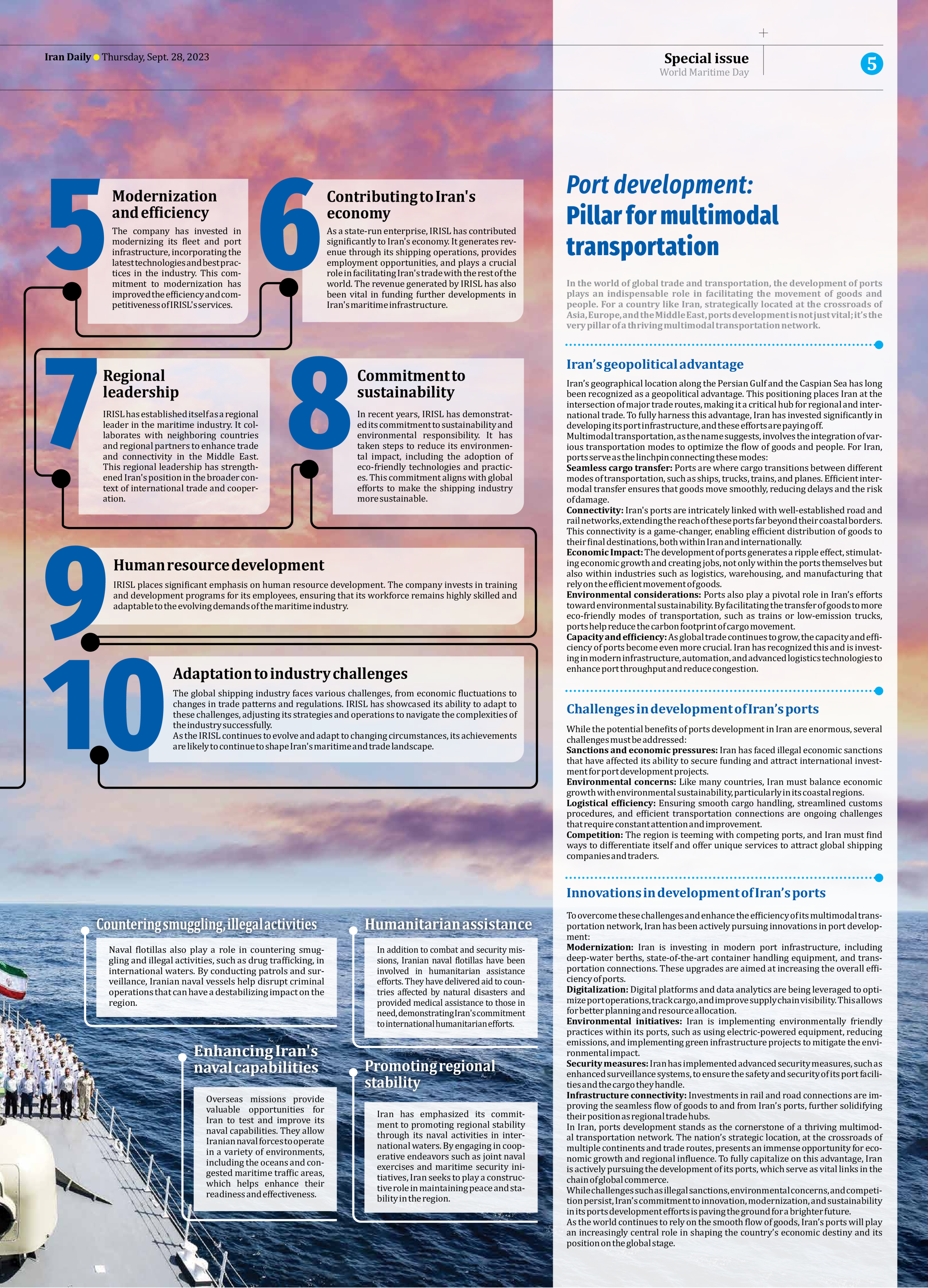
Port development: Pillar for multimodal transportation
In the world of global trade and transportation, the development of ports plays an indispensable role in facilitating the movement of goods and people. For a country like Iran, strategically located at the crossroads of Asia, Europe, and the Middle East, ports development is not just vital; it’s the very pillar of a thriving multimodal transportation network.
Iran’s geopolitical advantage
Iran’s geographical location along the Persian Gulf and the Caspian Sea has long been recognized as a geopolitical advantage. This positioning places Iran at the intersection of major trade routes, making it a critical hub for regional and international trade. To fully harness this advantage, Iran has invested significantly in developing its port infrastructure, and these efforts are paying off.
Multimodal transportation, as the name suggests, involves the integration of various transportation modes to optimize the flow of goods and people. For Iran, ports serve as the linchpin connecting these modes:
Seamless cargo transfer: Ports are where cargo transitions between different modes of transportation, such as ships, trucks, trains, and planes. Efficient intermodal transfer ensures that goods move smoothly, reducing delays and the risk of damage.
Connectivity: Iran's ports are intricately linked with well-established road and rail networks, extending the reach of these ports far beyond their coastal borders. This connectivity is a game-changer, enabling efficient distribution of goods to their final destinations, both within Iran and internationally.
Economic Impact: The development of ports generates a ripple effect, stimulating economic growth and creating jobs, not only within the ports themselves but also within industries such as logistics, warehousing, and manufacturing that rely on the efficient movement of goods.
Environmental considerations: Ports also play a pivotal role in Iran’s efforts toward environmental sustainability. By facilitating the transfer of goods to more eco-friendly modes of transportation, such as trains or low-emission trucks, ports help reduce the carbon footprint of cargo movement.
Capacity and efficiency: As global trade continues to grow, the capacity and efficiency of ports become even more crucial. Iran has recognized this and is investing in modern infrastructure, automation, and advanced logistics technologies to enhance port throughput and reduce congestion.
Challenges in development of Iran’s ports
While the potential benefits of ports development in Iran are enormous, several challenges must be addressed:
Sanctions and economic pressures: Iran has faced illegal economic sanctions that have affected its ability to secure funding and attract international investment for port development projects.
Environmental concerns: Like many countries, Iran must balance economic growth with environmental sustainability, particularly in its coastal regions.
Logistical efficiency: Ensuring smooth cargo handling, streamlined customs procedures, and efficient transportation connections are ongoing challenges that require constant attention and improvement.
Competition: The region is teeming with competing ports, and Iran must find ways to differentiate itself and offer unique services to attract global shipping companies and traders.
Innovations in development of Iran’s ports
To overcome these challenges and enhance the efficiency of its multimodal transportation network, Iran has been actively pursuing innovations in port development:
Modernization: Iran is investing in modern port infrastructure, including deep-water berths, state-of-the-art container handling equipment, and transportation connections. These upgrades are aimed at increasing the overall efficiency of ports.
Digitalization: Digital platforms and data analytics are being leveraged to optimize port operations, track cargo, and improve supply chain visibility. This allows for better planning and resource allocation.
Environmental initiatives: Iran is implementing environmentally friendly practices within its ports, such as using electric-powered equipment, reducing emissions, and implementing green infrastructure projects to mitigate the environmental impact.
Security measures: Iran has implemented advanced security measures, such as enhanced surveillance systems, to ensure the safety and security of its port facilities and the cargo they handle.
Infrastructure connectivity: Investments in rail and road connections are improving the seamless flow of goods to and from Iran’s ports, further solidifying their position as regional trade hubs.
In Iran, ports development stands as the cornerstone of a thriving multimodal transportation network. The nation’s strategic location, at the crossroads of multiple continents and trade routes, presents an immense opportunity for economic growth and regional influence. To fully capitalize on this advantage, Iran is actively pursuing the development of its ports, which serve as vital links in the chain of global commerce.
While challenges such as illegal sanctions, environmental concerns, and competition persist, Iran’s commitment to innovation, modernization, and sustainability in its ports development efforts is paving the ground for a brighter future.
As the world continues to rely on the smooth flow of goods, Iran’s ports will play an increasingly central role in shaping the country’s economic destiny and its position on the global stage.







